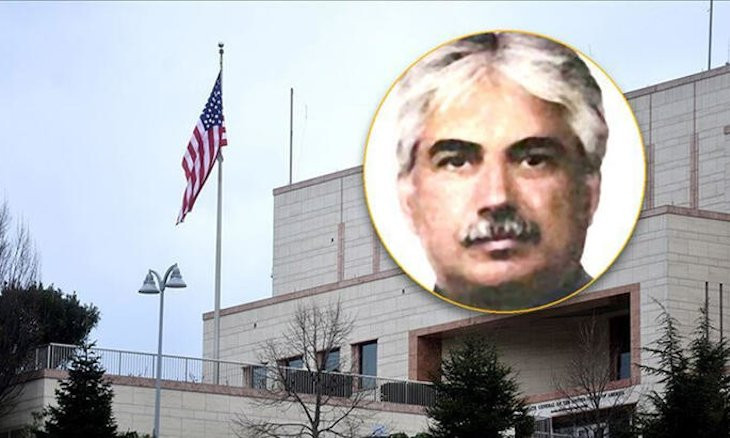Turkish gov't criminalizes dissidents with broadly defined anti-terrorism law, says US report
The U.S. State Department said in its 2019 report on terrorism that Turkey's broadly defined anti-terrorism law is being used by Ankara as a tool to detain and arrest opposition politicians and others critical of the government. “Prosecutors used a broad definition of terrorism and threats to national security to file criminal charges against and prosecute a broad range of individuals, including journalists, opposition politicians, activists, and others critical of the government,” it said.
Duvar English
Turkey has a broad definition of terrorism and the government regularly invokes the anti-terrorism law to criminalize freedom of expression and those critical of the authorities, the U.S. State Department said in its “Country Reports on Terrorism 2019” released on June 24.
 US Congress members pen letter to Pompeo for release of political prisoners in Turkey
US Congress members pen letter to Pompeo for release of political prisoners in Turkey“Turkey has a broad definition of terrorism that includes crimes against constitutional order and internal and external security of the state. The law criminalizes expression that justifies, praises, or incites persons to use coercion or violent methods used by a terrorist organization. The government regularly invoked the law to criminalize the exercise of freedom of expression, freedom of assembly, and other human rights,” the report said.
In 2019, Ankara continued to restrict people's freedoms under broad counterterrorism legislation, the report said.
“Prosecutors used a broad definition of terrorism and threats to national security to file criminal charges against and prosecute a broad range of individuals, including journalists, opposition politicians, activists, and others critical of the government,” it said.
Over 10,000 social media accounts referred to judiciary in three months alone
 Amnesty International launches campaign for release of political prisoners in Turkey
Amnesty International launches campaign for release of political prisoners in TurkeyTurkish authorities referred more than 10,000 social media accounts to the judiciary for alleged terrorist-related propaganda in the first quarter of 2019 alone, with more than 3,600 users facing legal action for their social media activities, the report said, basing the figures on the Interior Ministry data.
Detentions, arrests over Gülen links were 'often on the basis of scant evidence and minimal due process'
The authorities continued to detain and arrest Turkish citizens, as well as foreign citizens resident in Turkey – including U.S. citizens and locally employed staff at the U.S. Mission to Turkey – for alleged links to the Gülen network, the report said. The detentions and arrests were “often on the basis of scant evidence and minimal due process,” it said.
“In the aftermath of the July 2016 coup attempt, the Turkish government labeled the movement of self-exiled Fethullah Gulen as the 'Fethullah Terrorist Organization' ('FETO'). 'FETO' is not a designated terrorist organization in the United States,” it said.
The arrest and conviction of several U.S. consulate employees in Turkey in recent years has been one of the sources of friction between NATO allies.
 US 'deeply troubled' by Turkey's conviction of US consulate employee Topuz
US 'deeply troubled' by Turkey's conviction of US consulate employee TopuzMost recently, Metin Topuz, a Turkish citizen who worked as a liaison for the U.S. Drug Enforcement Administration (DEA) in Istanbul, was sentenced to eight years and nine months in prison on charges of aiding the Gülen network.
Following the conviction, the U.S. said that it was “deeply troubled” about the court's decision, whereas Ankara called on Washington to “respect the independence of the judiciary as well as abstain from attempts to interfere with.”
The U.S. State Department's report also, as in previous years, did not label the Syrian People's Protection Units (YPG) as a terrorist group, which was highly criticized by Ankara.
The Turkish government considers the YPG as an extension of the Kurdistan Workers' Party (PKK) and therefore as a terrorist organization.
The Turkish Foreign Ministry said in a written statement on June 25 that the U.S. report "attempts to conceal the fact that YPG is the same terrorist organization as PKK, by indicating that our country views YPG as the Syrian arm of PKK."
"This approach amounts to the abstention of explicitly emphasizing the terrorist identity of the YPG, and moreover confirms the cooperation between the USA and this terrorist organization," Turkish Foreign Ministry spokesperson Hami Aksoy said.
Aksoy also slammed the U.S. report for criticizing Turkey's stance regarding the Gülen network. "In this report, it is noticeable that the terrorist nature of FETÖ is being questioned and legitimate measures we have taken in our fight against FETÖ are criticized as it is used to be as in previous years. This situation is a proof of the continuation of US’s negligent attitude regarding the heinous coup attempt of 15th July," Aksoy said.
